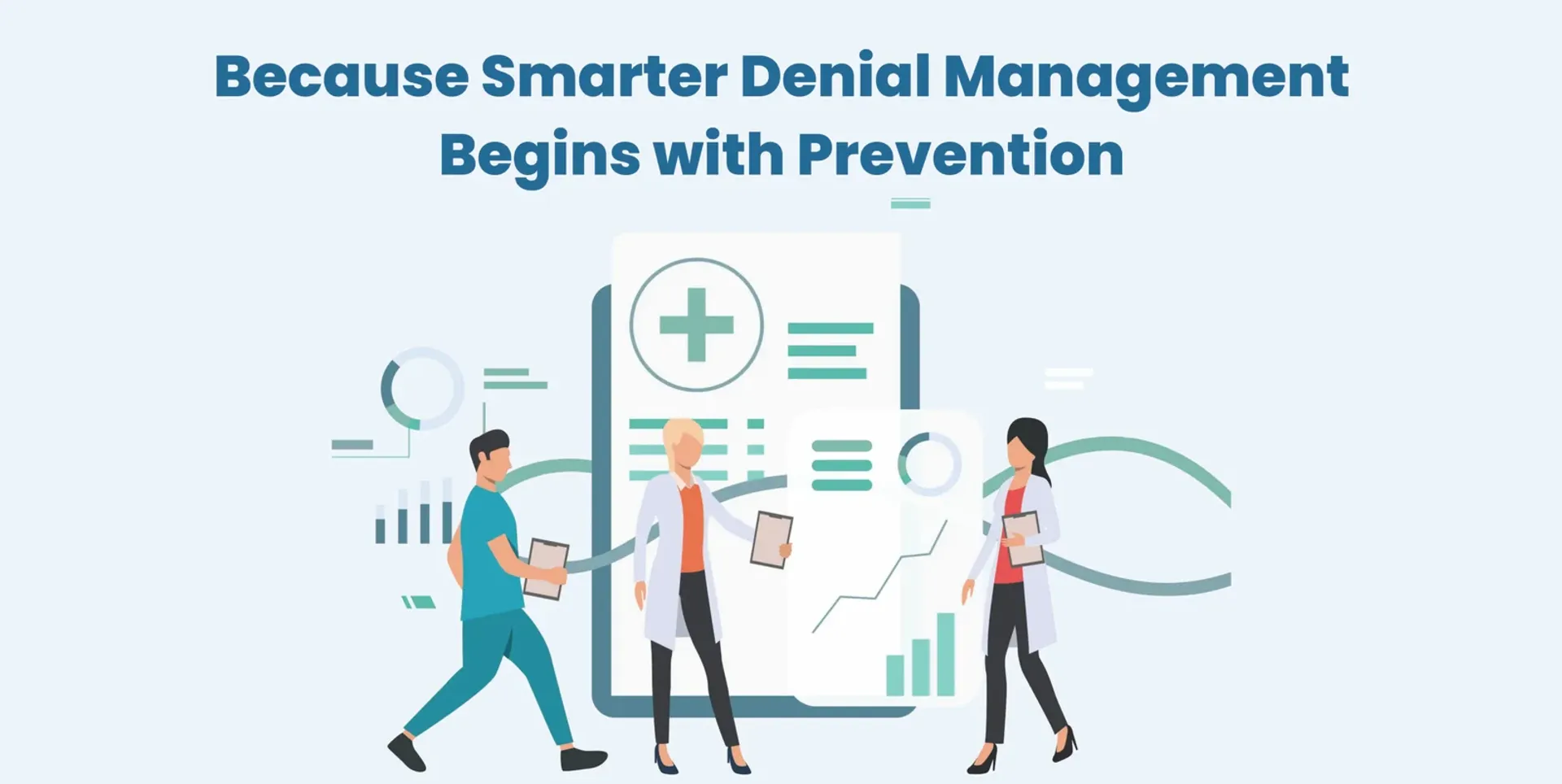DENIAL – who would think a six-letter word could carry so much weight, capable of undoing months of hard work, trapping revenue cycle management (RCM) teams into an endless rework loop, and challenging the very financial health of their systems?
Across the industry, claim denials have soared to 23% over the last five years, adding heavily to healthcare providers’ cost burden. For every dollar denied, some hospitals are even spending up to $181 chasing it. Interestingly, 86% of those denials are avoidable if addressed promptly with smarter denial management strategies.
The Pain, Though Invisible, Is Real
With prior authorization norms tightening in 2026, OBBBA-imposed Medicaid cuts looming, and a projected shortage of 86,000 healthcare workforce by 2036, pressures are sure to intensify the denial burden on health systems.
For many hospitals, this isn’t just about losing revenue. It’s also about losing the ability to survive in a tight-margin environment and continue their mission of patient care.
And yet, amid all this turmoil, a quiet technology revolution in healthcare RCM has already taken root, changing the game for healthcare providers.
Yes, artificial intelligence (AI) in RCM continues to top healthcare discussions for its ability to help providers see beyond the surface and realize their true revenue potential—if done right.
From Claim Post-Mortem to Denial Prevention with AI
For years, denial management has been a post-operative exercise—the financial post-mortem of a claim after it’s denied.
It has traditionally been a reactive, labor-intensive RCM process—involving addressing claims when rejected by payers, often without a clear understanding of why they were rejected or how inefficiency crept into the process resulting in those denials.
But AI is changing that.
Having moved beyond experimentation to actual execution, AI is now redefining how providers look at claims—not as a reactive port-mortem of claims lost to denials but as a predictable and prescriptive tool to prevent denials from happening in the first place.
Proactive Denial Prevention: Seeing Trouble Before It Strikes
With its contextual, analytical, predictive, and prescriptive capabilities, AI doesn’t just diagnose the problem; it also unmasks and fixes its root cause.
By ingesting and analyzing large volumes of claims data in real time, AI can pinpoint the root cause behind those pesky denials and connect the dots to predict revenue leaks caused by:
- Eligibility misses that impede patient access
- Documentation gaps that delay payer approvals
- Coding and billing errors that trigger rejections
- AR follow-up and appeal delays that block cash flow
AI is now being used as a potent weapon by providers to combat such manual RCM inefficiencies that escalate into denials.
Think of it as an intuitive, self-learning RCM agent capable of turning hindsight into foresight to not just foresee revenue risks but also prevent them.
Unmasking What the Human Eye Misses
AI’s core capabilities lie in predictive denial analytics—putting things into context to work claims as they should be.
It’s true power in healthcare RCM lies in its ability to see what the human eye misses. With its machine learning models continuously trained on historical claim patterns, payer nuances and behavior, and patient data, it flags at-risk claims before submission.
These models not only alert RCM teams to potential errors but also recommend corrective actions. For instance, AI can alert about inaccurate patient data that could put claims at risk and recommend the front-end team to verify the information.
By doing so, AI acts as a preemptive denial firewall, ensuring cleaner claims are submitted for faster reimbursements.
Hospitals that have embraced AI-powered RCM are already reporting:
- Up to 20% fewer denials
- 30% lower cost per claim
- 20–40% faster claims closure
The shift is clear: from reactive denial management to proactive denial prevention, AI has become the first-line defense for healthcare providers to safeguard their revenue.
Denial Resolution at Scale: AI at Work Fast-Tracking Collections
Even with thorough manual checks, some denials are bound to slip through.
And this is where AI-driven denial management comes into play, simplifying and streamlining what was once an arduous, manual chase into a precision-led automated revenue recovery workflow.
AI is now pushing its own boundaries in accounts receivable (AR) management in RCM to triage denials based on their value, impact, payer type, and recovery likelihood, ensuring that high-impact winnable claims and appeals are prioritized first.
Its smart machine learning models learn from previous claim resolution patterns and historical to help generate tailored appeal templates considering payer requirements and nuances, citing relevant medical necessity and appeal rationales to improve the success rate.
Denial Prevention Is the New Denial Management in RCM
AI isn’t just improving revenue cycle workflows. It’s redefining RCM and denial management altogether by transforming how claims are worked—fueling a shift from reactive denial management to proactive denial prevention.
By bringing together contextual intelligence through analytics (understanding payer behavior and mix and ensuring compliance with payer policies) and predictive capabilities (anticipating revenue leak risks and subsequent outcomes), AI is helping healthcare providers automate workflows and close the loop between resolution and prevention.
This convergence of analytics, automation, and AI is becoming the new playbook for RCM success for healthcare leaders.
How Jindal Healthcare Is Powering the Future of Denial Prevention
At Jindal Healthcare, we understand RCM complexities and believe smarter denial management is the key to securing every dollar earned and starts much before a claim is even submitted.
We have pushed the limits of AI in healthcare RCM with our proprietary agentic AI, Anka, that thinks, learns, and acts just like an expert and autonomously executes complex RCM tasks with precision.
Anka is our AI-powered RCM platform that integrates intelligent automation and predictive analytics across every stage of the revenue cycle—from eligibility verification and medical coding and billing to real-time claim monitoring, status checks, AR triaging, smart queuing and routing, and appeal automation.
Layered with agentic AI capabilities, Anka offers contextual intelligence for every claim and learns from claim history to identify at-risk denials, create a prevention path with corrective actions, and even initiate follow-ups and handle complex denial cases independently, helping improve AR recovery, reduce unnecessary write-offs, and dramatically decrease the turnaround time.
Anka doesn’t just automate workflows; it augments them, creating a self-learning revenue cycle that learns from each claim, each denial, and each payer response.
Bringing contextual intelligence to every claim, Anka enables healthcare RCM leaders to:
- Predict denials before submission with analytics-driven risk scoring
- Prevent avoidable revenue losses by addressing root causes in real time
- Resolve denials faster with prioritized claims and automated appeals
The result?
Fewer denials, faster payments, and stronger margins—driven by data and powered by AI precision.
The Age of Agentic AI: Denial Prevention Made Easy
Denials may never disappear from the financial books of healthcare leaders, but with AI-powered denial management, they no longer need to dictate the rhythm of your organization’s cash flow either.
Providers harnessing AI’s predictive, preventive, and prescriptive capabilities in their RCM are no longer living in denial but leading in denial prevention.
Cleary, the future of RCM belongs to those who can see what’s coming and act before it happens by building financial resilience with RCM that’s as precise as their care.
Connect with our experts today to see our agentic AI in action and discover how it can change your RCM game for improved collections, costs, and care.






